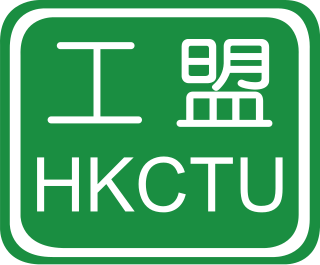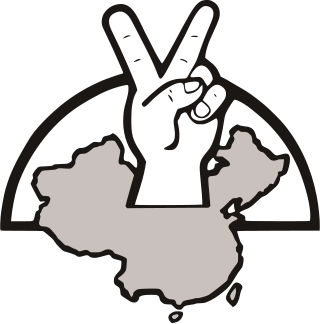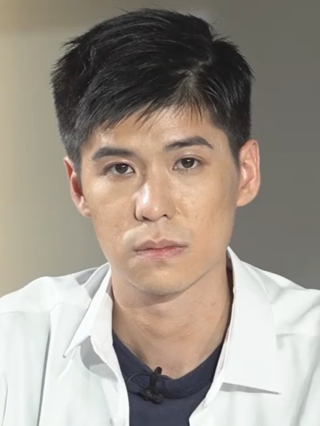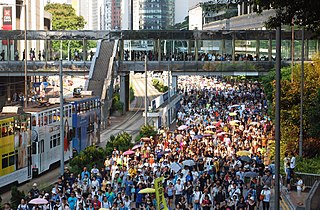
Martin Lee Chu-ming is a Hong Kong politician and barrister. He is the founding chairman of the United Democrats of Hong Kong and its successor, the Democratic Party, Hong Kong's flagship pro-democracy party. He was also a member of the Legislative Council of Hong Kong from 1985 to 1997 and from 1998 to 2008. Nicknamed the "Father of Democracy" in Hong Kong, he is recognised as one of the most prominent advocates for democracy and human rights in Hong Kong and China.

The Hong Kong Confederation of Trade Unions (HKCTU) was a pro-democracy labour and political group in the Hong Kong. It was established on 29 July 1990. It had 160,000 members in 61 affiliates and representation in the Legislative Council of Hong Kong (LegCo) to challenge government policies and push for legal protection of worker and trade union rights. It was one of the two most influential labour groups in Hong Kong, with the other one being the pro-Beijing Hong Kong Federation of Trade Unions.

Leung Kwok-hung, also known by his nickname "Long Hair" (長毛), is a Hong Kong politician and social activist. He was a member of the Legislative Council, representing the New Territories East. A Trotskyist in his youth, he was a founding member of the Revolutionary Marxist League. He became a political icon with his long hair and Che Guevara T-shirt in the protests before he was elected to the Legislative Council in 2004. In 2006, he co-founded a social democratic party, the League of Social Democrats (LSD) of which he was the chairman from 2012 to 2016.

Margaret Ng Ngoi-yee is a politician, barrister, writer and columnist in Hong Kong. She was a member of the Legislative Council of Hong Kong from 1995 to 2012.

The Hong Kong Alliance in Support of Patriotic Democratic Movements of China was a pro-democracy organisation that was established on 21 May 1989 in the then British colony of Hong Kong during the 1989 Tiananmen Square protests and massacre in Beijing. After the 4 June massacre, the organisation main goals were the rehabilitation of the democracy movement and the accountability for the massacre. The main activities the organisation held were the annual memorials and commemorations, of which the candlelight vigil in Victoria Park was the most attended, reported and discussed event each year. Due to its stance, the Central government in Beijing considers the organisation subversive.

The Civil Human Rights Front (CHRF) was an organisation that focused on the issues of Hong Kong politics and livelihood, affiliated with almost all pan-democratic camps in Hong Kong. It was founded on 13 September 2002 and disbanded on 15 August 2021.

Hong Kong independence is the notion of Hong Kong as a sovereign state, independent from the People's Republic of China (PRC). Hong Kong is a special administrative region (SAR) of China and is thus granted a high degree of de jure autonomy, as stipulated by Article 2 of the Hong Kong Basic Law ratified under the Sino-British Joint Declaration. Since the transfer of the sovereignty of Hong Kong from the United Kingdom to the PRC in 1997, a growing number of Hongkongers have become concerned about what they see as Beijing's encroachment on the territory's freedoms and the failure of the Hong Kong government to deliver "genuine democracy". Advocating for Hong Kong independence became illegal after the Hong Kong national security law in 2020.

Joshua Wong Chi-fung is a Hong Kong activist and politician. He served as secretary-general of the pro-democracy party Demosisto until it disbanded following the implementation of the Hong Kong national security law on 30 June 2020. Wong was previously convenor and founder of the Hong Kong student activist group Scholarism. Wong first rose to international prominence during the 2014 Hong Kong protests, and his pivotal role in the Umbrella Movement resulted in his inclusion in TIME magazine's Most Influential Teens of 2014 and nomination for its 2014 Person of the Year; he was further called one of the "world's greatest leaders" by Fortune magazine in 2015, and nominated for the Nobel Peace Prize in 2017.

Lester Shum Ngo-fai is a Hong Kong social activist and politician. He was a leader of the 2014 pro-democracy protests in Hong Kong and served as deputy secretary-general of the Hong Kong Federation of Students (HKFS) from April 2014 to March 2015. He was a member of the Tsuen Wan District Council for Hoi Bun from 2020 to 2021.

Nathan Law Kwun-chung is an activist and politician from Hong Kong. As a former student leader, he has been chairman of the Representative Council of the Lingnan University Students' Union (LUSU), acting president of the LUSU, and secretary-general of the Hong Kong Federation of Students (HKFS). He was one of the student leaders during the 79-day Umbrella Movement in 2014. He is the founding and former chairman of Demosistō, a new political party derived from the 2014 protests.

On 17 August 2017, three Hong Kong pro-democracy activists, Alex Chow, Nathan Law and Joshua Wong, were given prison sentences by the Court of Appeal for their roles in a protest at the Civic Square in front of the Central Government Complex in Tamar, Admiralty, on 26 and 27 September 2014. The events at the Civic Square helped set off massive pro-democracy protests, sometimes referred to as the Umbrella Movement, which lasted until police cleared the last of the protest sites in December 2014.

Benedict Richard Victor Rogers is a British human rights activist and journalist based in London. His work focuses on Asia, particularly Burma, North Korea, Indonesia, the Maldives, East Timor, Pakistan and Hong Kong. He is a regular contributor to The Wall Street Journal, The New York Times and The Huffington Post and has appeared on BBC, CNN, Sky, Al Jazeera and other television and radio stations.

Jimmy Sham Tsz-kit is a Hong Kong pro-democracy and LGBT rights activist. He served as a convener for the pro-democracy organisation Civil Human Rights Front (CHRF) until October 2020 and serves as a secretary for the LGBT rights organisation Rainbow of Hong Kong. He is a longtime member of the League of Social Democrats. In 2019 he was elected to the Sha Tin District Council by residents of Lek Yuen constituency, but he resigned from this position in July 2021 amidst a government crackdown on pro-democracy councillors.

The Hong Kong national security law, officially the Law of the People's Republic of China on Safeguarding National Security in the Hong Kong Special Administrative Region is a national law of China on Hong Kong national security passed in 2020. It is implemented in Hong Kong in accordance with Hong Kong Basic Law Article 18, which allows for Chinese laws to be valid in Hong Kong if they are included in Annex III. It was formulated under the authorization of the National People's Congress decision on Hong Kong national security legislation. The law was passed on 30 June 2020 by the Standing Committee of the National People's Congress as a means of resolving the anti-extradition bill protests instigated by a Hong Kong local bill proposed in 2019 to enable extradition to other territories including the mainland, and came into force the same day.

The 2020 Hong Kong pro-democracy primaries were held on 11 and 12 July 2020 for selecting the numbers of pro-democracy candidates for the subsequently postponed 2020 Legislative Council election to maximise the chance for the pro-democrats to achieve a majority in the 70-seat Legislative Council.

The month of August 2020 in the 2019–2020 Hong Kong protests saw only sparse and relatively small protests, mainly due to the city going through a third wave of the COVID-19 pandemic and an outdoor gathering ban on groups of more than two people. As the impact of the Hong Kong National Security Law on the city became increasingly evident, and additionally in response to acts by representatives of the local and mainland governments throughout the protests, Western democracies continued to voice sharp criticism and implemented sanctions against China, with the United States imposing sanctions on 11 Hong Kong officials on 7 August. These developments supported the opinion expressed by former British Foreign Secretary Malcolm Rifkind in late June that the protests had morphed from a mostly local dispute into an international one.

On 6 September, the biggest protests in the course of the 2019-20 Hong Kong protests since 1 July occurred in the city. The fresh protests were in a large part due to the day having been the scheduled election day for the Legislative Council; on 31 July, the Hong Kong government had the elections postponed by a year, citing the COVID-19 pandemic, a justification that was widely doubted. The unauthorized protests resulted in nearly 300 arrests, one of them on suspected violation of the national security law, and brought the total number of arrests during the entire protests since June 2019 to above 10,000.

Figo Chan Ho-wun is a Hong Kong pro-democracy activist who served as convener of the Civil Human Rights Front from October 2020 until his conviction in May 2021, when he was succeeded by Chung Chung-fai. As vice-convener of the organisation Chan and then convener Jimmy Sham Tsz-kit, planned major marches during the 2019–20 Hong Kong protests. In November 2019, Chan and Emily Lau were awarded the John McCain Prize for Leadership in Public Service on behalf of the people of Hong Kong during the Halifax International Security Forum. He also is member of the League of Social Democrats.

Hong Kong Democracy Council (HKDC) is a Washington, DC-based nonpartisan, non-governmental organization (NGO) with a stated mission of "protect[ing] Hong Kong's basic freedoms, autonomy, and the rule of law." HKDC's research and political work focuses on "educational outreach, community empowerment, and policy advocacy".

Joey Siu Lam is an American human rights activist. During her time in Hong Kong as a student in the City University of Hong Kong, she served as spokesperson of the Hong Kong Higher Institutions International Affairs Delegation (HKIAD) and lobbied internationally on human rights issues during the 2019–2020 Hong Kong protests.



















